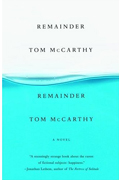
The Morning News Tournament of Books, sponsored by Powell’s Books, is an annual battle royale amongst the top novels in “literary fiction” published throughout the year. Read more about this year’s tournament »
» Buy the Books at Powells.com «
» Meet This Year’s Judges «
» Wager for Charity «
» Relive the Action: ’07, ’06, ’05 «
» Contact the Tournament Staff «
• ROUND TWO • MATCH FOUR •
March 24, 2008
 |
Remainderby TOM McCARTHY |

|
| v. | ||
The Shadow Catcherby MARIANNE WIGGINS |
judged by MARK LIBERMAN
Wiggins wins.
Tom McCarthy’s Remainder is an intricately wrought and self-consciously unpleasant story about cerebral trauma as a philosophical system. It’s memorable, in the way that botched surgery and disastrous trips are memorable. Without my responsibility as a judge, I wouldn’t have finished it.
Marianne Wiggins’s The Shadow Catcher is about “disappearing fathers” and the children who love them. The storyline features some of the most implausible plot coincidences since Little Dorrit. But in between the conventional anti-male rhetoric and the Rube Goldberg plot, there are some gripping stories and compelling characters.
So The Shadow Catcher wins this round.
Remainder is full of cardboard characters doing boring things in complicated and repetitive ways, animated by a brain-injured narrator who feels compelled to treat life as if it were physical therapy (“That’s the way I’ve had to do things since the accident: understand them first, then do them.”). He describes months of repetitive visualization and physical practice to re-learn how to raise a carrot to his mouth. After his motor system is more or less repaired, he applies the same technique obsessively to other areas of his life (“No Doing Without Understanding: the accident bequeathed me that forever, an eternal detour.”) Given an £8.5-million legal settlement, he can act out his obsessions by hiring a large staff and buying whole buildings, which he uses as stage sets to enact, over and over again, situations and events that may or may not ever have been real.
In the beginning, the narrator’s obsessive reenactments are eccentric, focusing on things like the shape of a crack on the wall, the smell of liver cooking, and the sound of someone practicing Rachmaninov on the piano. By the end of the book, he’s graduated to murder, which he greets as if it were just another interesting and slightly unpleasant aspect of his therapy. Here he confronts the troublesome carrot:
This carrot, though, was more active than me: the way it bumped and wrinkled, how it crawled with grit. It was cold.And here he contemplates someone he’s just shot:
The wound was raised, not sunk; parts of his flesh had broken through the skin and risen, like rising dough. The flesh was both firm and soft; it gave to the touch but kept its shape.There are intimations of ritual and redemption:
I and the other reenactors were like a set of devotees to a religion not yet founded: patient, waiting for our deity to appear, to manifest himself to us, redeem us; and our gestures were all votive ones, acts of anticipation.You may or may not enjoy learning that it all pays off for him in the end:
Matter, for all my intricate preparations, all my bluffs and sleights of hand, played a blinder. Double-bluffed me. Tripped me up again. I know two things: one, it was a fuck-up; two it was a very happy day.That’s the day that starts with two men being killed during the reenactment of a bank robbery, and ends with the narrator forcing his pilot at gunpoint to loop back and forth over an outbound flight pattern:
I looked out of the window again. I felt really happy. We passed through a small cloud. The cloud, seen from inside like this, was gritty, like spilled earth or dust flakes in a stairwell. Eventually the sun would set forever—burn out, pop, extinguish—and the universe would run down like a Fisher Price toy whose spring has unwound to its very end. Then there’d be no more music, no more loops. Or maybe, before that, we’d just run out of fuel.We never learn the narrator’s name. Though perhaps I missed it—McCarthy succeeds in bringing the reader into something like his narrator’s frame of mind, and frankly, I noticed more than once that I had apparently read several pages in a sort of fugue state, without remembering anything.
You won’t be surprised to learn that there are some philosophical pretentions in the background. The author is the Secretary-General of the International Necronautical Society (“…mankind’s sole chance of survival lies in its ability, as yet unsynthesized, to die in new, imaginative ways”). The INS announced in 2003 that
Simon Critchley is formally appointed to the post of Chief Philosopher, having already acted unofficially in this capacity for a number of years by infecting the bloodstream of an otherwise un-necronautical Anglo-American philosophical culture with the viral and necrotic work of continental philosophers such as Blanchot, Heidegger, Levinas, and Derrida …And the author’s web site, Surplus Matter, offers an interview in which “Tom McCarthy argues that ‘Matter is what makes us alive’ and explains how the narrator of Remainder starts off as a disciple of Hegel and ends up on the side of Bataille.”
If you like that sort of thing, Remainder will be just the sort of thing that you like. You can have my copy, and welcome to it.
• •
I’ll keep my copy of Marianne Wiggins’s The Shadow Catcher, to lend to someone with complicated father issues. Because nobody’s father issues are as complicated as hers.[Warning: Plot spoilers ahead.]
One of the disappearing fathers in The Shadow Catcher is Marianne Wiggins’s own—or at least, the story’s narrator is also named Marianne Wiggins, and her father, John Wiggins, disappeared in 1970. More exactly, he hanged himself from a tree in Shenandoah National Park. However, it turns out that the passing motorist who found her father’s body—up to that time an impeccably responsible sleeping-car porter named Curtis Edwards—secretly took her father’s wallet and stole his identity, in order to head out to Las Vegas and carry out a disappearing act of his own, apparently motivated by his secret homosexuality.
In 2000, narrator-Wiggins’s dad shockingly appears to reappear, when a Las Vegas hospital calls her up because she’s listed as the next of kin for the erstwhile John Wiggins, who’s in a post-heart-attack coma.
At that point, narrator-Wiggins has just finished a meeting with some movie studio executives, pitching her novel on Edward Curtis, a photographer known for his iconic images of North American Indians. The studio execs are enthusiastic. “What passion! What personal courage!” Narrator-Wiggins has a more jaded perspective: Curtis posed his pictures and exoticized his subjects; he was funded by the railroad magnates who destroyed the Indians’ environment; and he repeatedly abandoned his family to pursue his obsessions, or just to be unexplainedly elsewhere.
And guess what: Edward Curtis’s longest unexplained absence was to live in Las Vegas, in the same apartment complex catering to male dancers where narrator-Wiggins discovers that Curtis-Edwards-pretending-to-be-John-Wiggins lived four decades later. There she finds a priceless collection of photographic prints and Indian artifacts, which Edward-Curtis-hiding-out-in-Vegas left to his lover Enrico, who in turns left them to Clarita Mendoza, the landlady.
At the movie-studio lunch, her agent asks “I’m curious to know how you fell back in love with him enough to write the novel”. Her answer is to show him a polaroid of Curtis’s grave, in Forest Lawn, where his four children are buried with him, two on either side. “There must have been something wonderful about him, for all four grown-up kids to want to be there”, she says.
Or maybe it wasn’t something so wonderful. Later, in the one of the story-within-a-story chapters about Edward Curtis, she writes:
If Edward, the disappearing father, was to be the GOOD GUY in their sytem of belief, then someone—anyone—had to play the villain, because, surely, there was real unhappiness in their homes, in everything around them, and someone, never Dad, no, never him, someone else had to take the blame.But in the end, Wiggins keeps her emotional options open. Along with the terrific embedded story about Clara Phillips and Edward Curtis in the Pacific Northwest of the 1890s, her combination of passion and ambiguity is what I liked most about this novel. It ends at Edward Curtis’ grave in Forest Lawn, where narrator-Wiggins burns some herbs given to her by Lester Owns-His-Shadow, the son of the Navajo man who “scouted sites and translated for Mr. Curtis in ought eight, ought nine”:
The person who was doing all the yelling when the bills came in.
The person was too tired to cook dinner after working all day long. That other, unromantic parent asleep at the stove in her flannel slippers. Stressed-out and exhausted.
Mom.
And if the bullet traces of the disappearing fathers are scattered all across the fabric of our nation’s family stories, who’s to blame for all the exit wounds?
Who’s to blame if men keep taking off, lighting out for unknown territories?
Must be the woman’s fault.
Must be something that the woman did or did not do.
I take Lester’s packet and rummage for matches in the earthquake kit I keep in my car, then I go to sit beside his grave to start this ritual.
Pine needles and other debris have gathered on the nameplate set into the earth, littering his name LOVING FATHER, and as I clean the litter with my hands I speak to him, You’re going to like the smell of this, old man, you’re going to be reminded of those places you lit out to.
• About the Judge •
• From the Booth •
| There was a lot of support for Remainder out in the precincts and I could hear a lot of folks rooting for him in today’s match. | Kevin | John | Our Tournament mirrors that of our N.C.A.A. basketball inspiration, where early-round upsets are often erased as chalk holds in subsequent match-ups. |
» Read Kevin Guilfoile & John Warner’s commentary on the match «

» DOWNLOAD THE BRACKETS «
• Round One •
Tree of Smoke v. Ovenman
judged by Tobias Seamon
The Savage Detectives v. Let the Northern Lights Erase Your Name
judged by Elizabeth Kiem
Then We Came to the End v. Petropolis
judged by Anthony Doerr
You Don’t Love Me Yet v. New England White
judged by Jessica Francis Kane
Run v. Shining at the Bottom of the Sea
judged by Kate Schlegel
What the Dead Know v. The Brief Wondrous Life of Oscar Wao
judged by Elizabeth McCracken
On Chesil Beach v. Remainder
judged by Ze Frank
The Shadow Catcher v. An Arsonist’s Guide to Writers’ Homes in New England
judged by Helen DeWitt
• Round Two •
Tree of Smoke v. Let the Northern Lights Erase Your Name
judged by Mark Sarvas
Then We Came to the End v. You Don’t Love Me Yet
judged by Maud Newton
Shining at the Bottom of the Sea v. The Brief Wondrous Life of Oscar Wao
judged by Ted Genoways
Remainder v. The Shadow Catcher
judged by Mark Liberman
• SEMIFINALS •
Tree of Smoke v. Then We Came to the End
judged by Gary Shteyngart
The Brief Wondrous Life of Oscar Wao v. The Shadow Catcher
judged by Nick Hornby
• ZOMBIE ROUND •
Then We Came to the End v. Remainder
judged by Rosecrans Baldwin
The Brief Wondrous Life of Oscar Wao v. The Savage Detectives
judged by Andrew Womack
• FINAL ROUND •
Remainder v. The Brief Wondrous Life of Oscar Wao
All Judges + Jennifer Szalai

